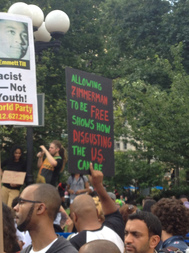| | And they tend to react with anger or dismay when they disagree with a verdict. There is nothing new in that observation. Also, there is little to suggest that the larger issues raised by some of these trials, if there were any, were moved one direction or the other by the results. The late Rodney King famously urged Americans to stop rioting after the officers who had beaten him were acquitted, asking the timeless question, “Can we all just get along?” If we could, we wouldn’t need to keep having these trials. Last week, before the Zimmerman verdict, Washington Post columnist Kathleen Parker wrote that it may be time to remove television cameras from courtrooms for such high-profile trials. Cameras, she said, change the way people act. “We've always known this on some abstract level, but our curiosity — and, ostensibly, our mighty respect for the public's right to know — has clouded our judgment. There may be no way to quantitatively prove that cameras influence courtroom behavior and, possibly, a trial's outcome. But anyone who has ever sat in front of a camera knows that it is so.” That argument hasn’t changed much since the idea of televising trials first sprouted, but don’t look for cameras to disappear any time soon. A reasonable argument can be made that cameras affected the outcome of O.J. Simpson’s (first) trial. I don’t think the argument is as strong with the Zimmerman trial, for which plenty of outside pressure weighed in favor of conviction. The difference was in how the judges took control of their courtrooms. The Zimmerman jury was sequestered; Simpson’s was not. Zimmerman was tried in Florida; Simpson practically in the shadows of Hollywood. Last month, again well before the Zimmerman verdict, Rasmussen Reports published the results of a nationwide telephone poll asking people whether the justice system is fair. Only 45 percent said it was fair to most Americans. That was still a plurality, because only 39 percent said it wasn’t fair and 16 percent weren’t sure. Also, only 34 percent said they think the system is fair to the poor. A lot of things probably are unfair to the poor, from the way landlords respond to problems to the health care they receive and their own lack of political clout. Still, it is important for citizens in a free country to have faith in their institutions, and there aren’t many institutions more important than the criminal justice system. A lot of “trials of the century” have come and gone in the last century. Only a few are remembered widely beyond a cadre of people with Ph.D.s in history. We remember the Linbergh kidnapping trial, which many people today believe led to the wrong man, Bruno Hauptmann, being convicted, in part because of prejudice against immigrants. We remember O.J. because of his celebrity, although his subsequent conviction on other charges reduced the importance of the first trial somewhat. Other trials fade quickly from memory, despite all the hoopla they generate (Heidi Fleiss, anyone?). Where will the George Zimmerman trial end up years from now? And will his acquittal change anything at all? My guess is it fades away and nothing changes. |
|
0 Comments
Your comment will be posted after it is approved.
Leave a Reply. |
Search this siteLike what you read here? Please subscribe below, and we'll let you know when there is a new opinion.
The author
Jay Evensen is the Opinion Editor of the Deseret News. He has more than 40 years experience as a reporter, editor and editorial writer in Oklahoma, New York City, Las Vegas and Salt Lake City. He also has been an adjunct journalism professor at Brigham Young and Weber State universities. Archives
July 2024
Categories
All
Links
|


 RSS Feed
RSS Feed

